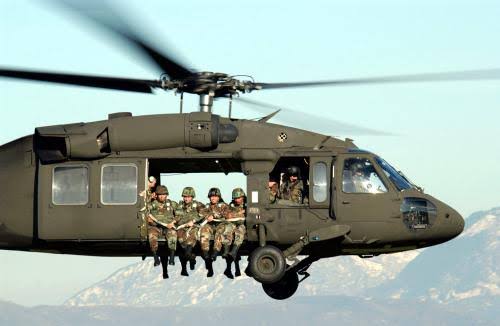UH 60 Helicopter: Advanced Avionics and Battle Systems
UH 60 Helicopter: Advanced Avionics and Battle Systems
Blog Article
The Impact of Sustainable Practices on the Future of Airplane Procedures and Emissions Reduction
As the aviation sector faces boosting analysis over its environmental effect, the fostering of lasting practices emerges as an important path toward future aircraft operations and discharges reduction. Technologies in sustainable air travel fuels and advancements in hybrid propulsion modern technologies stand at the leading edge of this change, promising substantial decreases in greenhouse gas emissions.

Introduction of Sustainable Practices
Sustainable practices in airplane procedures encompass a range of strategies targeted at decreasing ecological impact while preserving operational effectiveness. These techniques are necessary in the aeronautics sector's dedication to lessening its carbon impact and adhering to international ecological requirements. Trick campaigns consist of enhancing trip paths to decrease fuel consumption, boosting upkeep procedures to guarantee airplane operate at peak effectiveness, and carrying out sophisticated technologies such as winglets and light-weight products that boost the rules of aerodynamics.

Involving and training staff on sustainability techniques additionally play a vital duty, cultivating a culture of ecological responsibility within organizations. Generally, the integration of these sustainable methods not only assists reduce emissions however also improves the lasting practicality of the aeronautics field, guaranteeing it fulfills the demands of both consumers and regulative bodies while adding to global sustainability goals.
Ingenious Gas Alternatives
Many cutting-edge fuel options are arising as essential remedies to reduce the air travel sector's dependence on traditional fossil fuels. Among these options, Sustainable Aeronautics Gas (SAFs) have actually obtained considerable interest as a result of their possible to reduce lifecycle greenhouse gas emissions by up to 80% compared to conventional jet fuels. SAFs are originated from different feedstocks, consisting of waste oils, farming deposits, and even algae, making them a flexible choice for the sector.
One more appealing choice is hydrogen fuel, which, when utilized in fuel cells, creates only water vapor as a by-product. In addition, electrical propulsion systems are being discovered, leveraging battery modern technology to power aircraft.
Lastly, biofuels originated from biomass are being checked out, providing a sustainable choice that can be mixed with typical gas. Collectively, these cutting-edge fuel choices represent an important action towards accomplishing a sustainable air travel ecosystem, straightening with international emissions decrease targets and improving the industry's ecological stewardship.
Technological Innovations in Aviation

How can technical innovations improve the future of aviation? Developments such as electrical and hybrid propulsion systems are at the center, encouraging substantial decreases in gas intake and greenhouse gas discharges.
In addition, the application of innovative products, such as lightweight composites, adds to improved the rules of aerodynamics and fuel efficiency. Making use of expert system and artificial intelligence in flight procedures enhances route planning and decreases fuel burn by allowing real-time changes based on weather condition and website traffic conditions. In addition, the advancement of independent and from another location piloted airplane systems stands to revolutionize cargo and traveler transportation, possibly boosting performance while lessening human mistake.
In addition, lasting aviation innovations, including sophisticated air website traffic monitoring systems, can minimize and streamline procedures blockage, bring about reduced discharges during flight. These advancements collectively stand for a paradigm shift in aviation, guaranteeing a future where sustainability and operational efficiency are intertwined, thus sustaining the industry's commitment to reducing its ecological influence.

Regulative Structure and Compliance
Due to the growing emphasis on ecological stewardship within the air travel market, the governing structure regulating airplane procedures is advancing to promote lasting methods. Regulatory bodies, such as the International Civil Aeronautics Company (ICAO) and different nationwide air travel authorities, are introducing strict standards targeted at decreasing discharges and enhancing functional performance.
These policies usually include the adoption of Sustainable Aeronautics Fuel (SAF), which has been recognized as an essential part in attaining lower my site carbon footprints. Moreover, conformity with these policies requires airline companies to apply functional practices and innovative technologies, such as maximized trip paths and boosted air web traffic monitoring, to decrease fuel intake.
In addition, the enforcement of discharges trading plans and carbon countering efforts is becoming increasingly widespread, compelling airline companies to keep an eye on and report their emissions accurately. Non-compliance can lead to significant penalties, thus pressing drivers to focus on sustainability in their company models.
Eventually, the advancing governing landscape not just drives advancement and investment in green modern technologies yet likewise cultivates a culture of accountability within the air Click Here travel sector. As these structures remain to establish, the focus on lasting practices will be integral to attaining the sector's long-term environmental goals.
Future Patterns in Airplane Operations
As the air travel sector adapts to a significantly rigid regulative environment, future fads in airplane procedures are set to concentrate on innovative solutions that even more boost sustainability and efficiency - uh 60. Secret developments will likely consist of the adoption of sophisticated air traffic management systems, which use real-time data and artificial intelligence to enhance flight paths, lowering fuel usage and discharges
One more substantial trend is the increased integration of sustainable air travel gas (SAFs) These alternatives to conventional jet fuel, originated from renewable resources, can significantly decrease lifecycle greenhouse gas discharges. The sector's commitment to SAFs will likely increase as airline companies collaborate with gas producers to make certain schedule and cost-effectiveness.
Furthermore, the press towards electrification and crossbreed propulsion systems is obtaining energy. Emerging aircraft styles will certainly incorporate these innovations, supplying quieter and a lot more efficient procedures, particularly for short-haul trips.
Conclusion
The fostering of sustainable aviation gas, coupled with innovations in hybrid and electrical propulsion systems, is vital for decreasing lifecycle greenhouse gas discharges. Enhancing trip courses and accepting innovative modern technologies contribute to a quieter and much more eco pleasant air travel field.
Developments in lasting aviation gas and developments in hybrid propulsion here are the findings technologies stand at the forefront of this transformation, appealing substantial reductions in greenhouse gas emissions.Various ingenious gas choices are emerging as critical services to minimize the aviation market's dependence on standard fossil fuels - uh 60. Among these alternatives, Sustainable Aviation Gas (SAFs) have actually obtained substantial focus due to their potential to decrease lifecycle greenhouse gas discharges by up to 80% compared to conventional jet gas.An additional significant trend is the boosted assimilation of lasting aviation fuels (SAFs) The adoption of sustainable air travel gas, paired with developments in electrical and hybrid propulsion systems, is important for lessening lifecycle greenhouse gas exhausts
Report this page